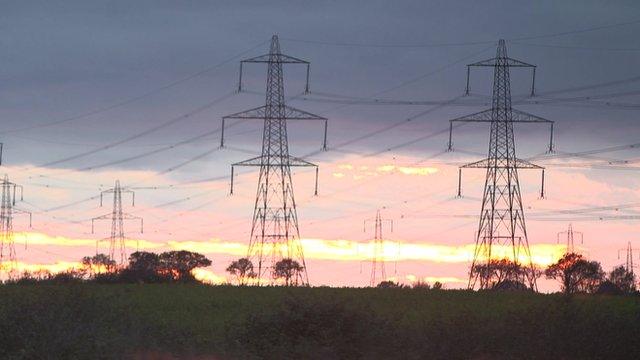Can they cut our energy bills and keep the lights on?
- Published
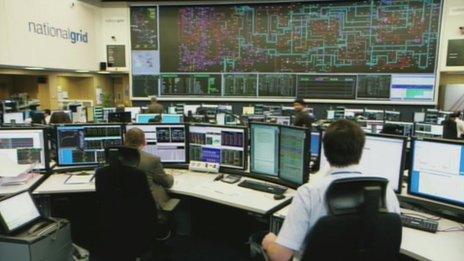
The exact location of the National Grid's control centre has to remain secret
Politicians are under pressure to confront the Big Six as energy bills shoot up but the suppliers claim they need to pay for investment in infrastructure and have warned of power cuts in the future. For The Editors, a programme that sets out to ask challenging questions, I wanted to find out whether power cuts are a real risk.
Its exact location is meant to be secret.
There are no signs outside - beyond, that is, the high fences and heavy security that hint at the importance of what lies beyond.
This building is where of the heart of the British economy is kept pumping.
Inside giant screens show a maze of blue and red lines - the country's veins and arteries. They are the principal power lines that link up to form the National Grid. We are at the company's national control centre somewhere in Berkshire.
The job of the people working at the banks of desks here is to make sure there is enough power flowing to meet the demands of businesses and homes.
The demand fluctuates not just season to season and day to day but second to second.
A green line on one part of the wall shows the national demand for energy at any moment in time. A yellow line indicates how much power is being produced by power stations.
On my visit there was a dramatic drop in demand. The nation had paused for the two-minute silence on Remembrance Day.
If I had hung around for the latest episode of "Strictly" I would have seen a surge as millions switched on the kettle to make a cup of tea, having seen the result.
The day they remember here as "the big one" was the royal wedding - demand dropped away during the ceremony and, after the couple kissed on the balcony at Buckingham Palace, there was a surge in demand as people left their televisions.
What, I ask, if the forecasters - who study the weather and the TV schedules - don't get it right?
What if the guy who rides the faders - in effect turning power stations on, off, down or up - gets it wrong?
The answer from the man from the Grid is striking: "Within 10 seconds we'll have massive power cuts all over the country."
Perhaps realising what he's said, he adds: "But the good news is, he always does and National Grid have a great track record."
Massive power cuts - the equivalent of a national heart attack - are every energy secretary's nightmare - more so even than those ever-rising bills.
After the last few weeks you could be forgiven for thinking politicians are obsessed with that one thing and one thing only.
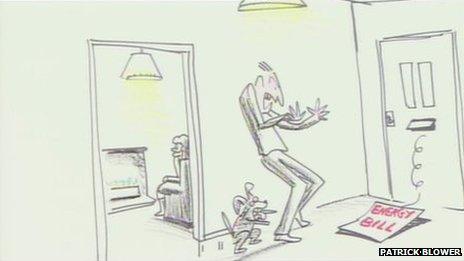
Irate customers faced with soaring energy bills are putting pressure on politicians
In fact, though, anyone drawing up an energy plan for Britain needs to balance three things: not just how to curb bills, not just how to keep Britain's lights on but also how to "go green".
That is what some call the energy "trilemma" because, at least in the short term, those three objectives can appear to be in conflict.
The energy regulator Ofgem recently predicted the risk of serious power cuts would rise to a one-in-12-year probability by the time of the next election.
The reason?
Old dirty coal- and oil-fired stations are being closed but new cleaner ones have yet to be built.
The safety margin, between how much energy we are expected to need and how much is expected to be generated is predicted by the National Grid to drop to around 4% by 2015 - recently it was as high as 15%.
One executive of a major British company told me he was so concerned by this he was ordering every one of his factories to be energy self-sufficient.
To avoid those power cuts, to increase that margin, to build more power stations or wind farms requires investment - private sector investment.
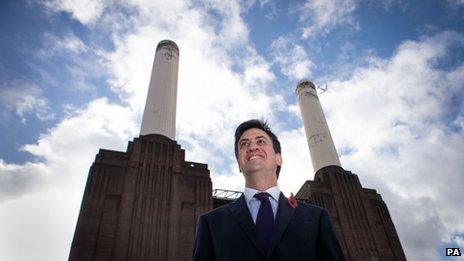
Ed Miliband's promise to freeze energy bills in 2015 turned up the heat in the debate
That means companies need confidence they can raise the funds and make the return they need. That is where the politics of keeping the lights on and cutting energy bills and going green clash.
It was Ed Miliband's party conference promise that a Labour government would freeze energy bills for 20 months that turned the heat up under this debate.
More significant in the long term is the party's commitment to restructure the big six energy companies while that happens.
What the energy firms are asking along with many market analysts is - who would borrow or spend hundreds of millions of pounds in such an uncertain climate?
Ministers in the Coalition are keen to echo that, given their desire to say that the freeze is a "con".
But they too are accused of killing investment by the uncertainty that surrounds their own energy policy.
The prime minister, who once promised to lead "the greenest government in history", is now alleged to have spoken privately of his desire to get "green crap" off consumer bills.
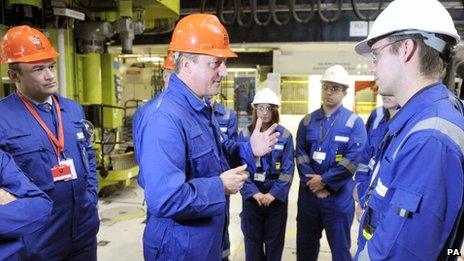
David Cameron promised to lead the "greenest government in history" but is finding it tough to balance that pledge with cuttings bills and ensuring supplies
The chancellor has resisted Liberal Democrat demands for tougher long term targets to combat climate change.
Big subsidies for wind power promoted on one side of Whitehall by the Department of Energy and Climate Change have been opposed on the other side of it by the Treasury who think fracking could supply Britain with large quantities of cheap shale gas.
George Osborne looks enviously across the Atlantic, where fracking has given the US both long dreamt of energy security and plummeting prices which the European Commission says are putting the European manufacturing companies at a serious disadvantage.
Will the money be found for new gas or wind while that tension remains unresolved? If not, the probability of those power cuts will get shorter.
In next week's autumn statement we will see the government's answer to Labour's price freeze promise and to consumer anxiety about rising bills.
The Exchequer will, no doubt, pick up the cost of some subsidies for green energy and cushion bills for poorer households.
The taxpayer rather than the bill payer will pick up part - though certainly not all - of the estimated £2.5bn tab for all those levies and schemes.
What my visit to the Grid reminded me is that it will do nothing to resolve the energy trilemma long term.
It will not solve Britain's energy crisis, which requires not just lower bills and greener energy but investment so that the next time there's a royal kiss or a dance-off you don't notice the lights flickering, the TV go black and, if you listen very very hard, a man in a secret location in Berkshire scream: "Aargh! That wasn't meant to happen."
Nick Robinson examines whether politicians can prevent power cuts
BBC News: The Editors features the BBC's on-air specialists asking questions which reveal deeper truths about their areas of expertise. Watch it at 23:20 GMT on Monday 25 November on BBC One (except in Wales or Northern Ireland) or later on the BBC iPlayer.
- Published26 November 2013
